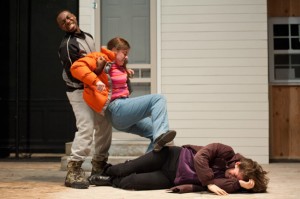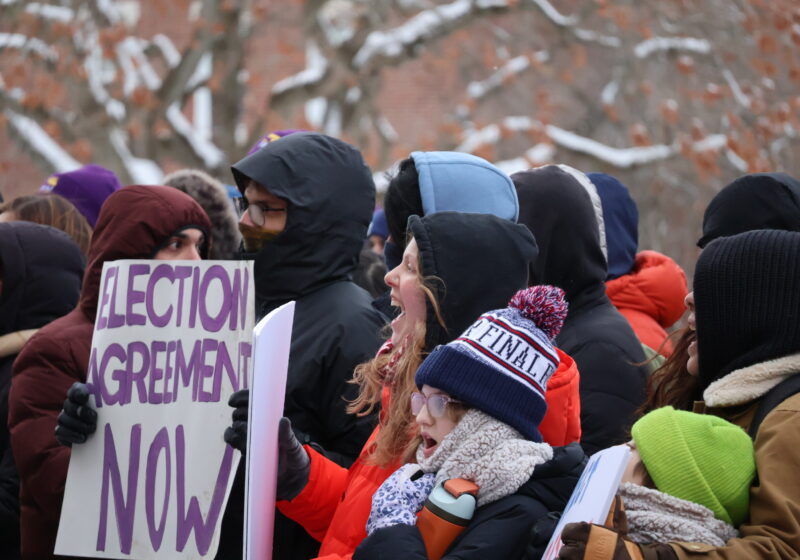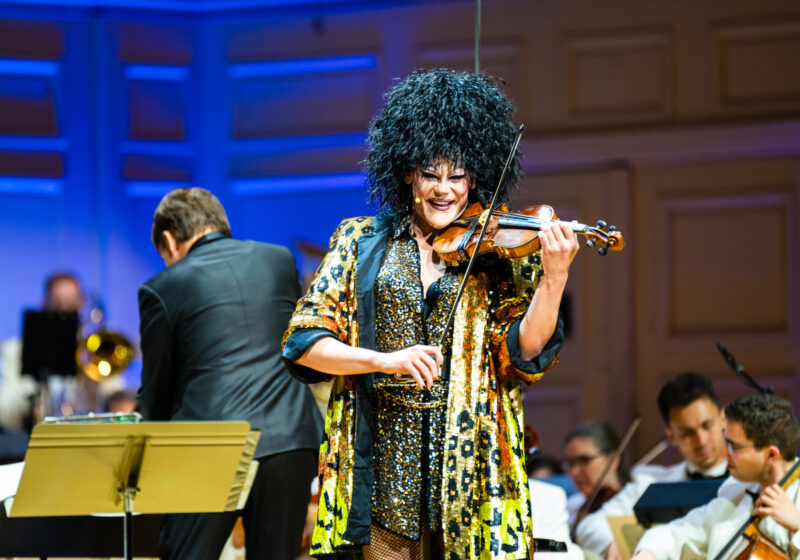One would expect a play cycle about pedophilia to be a disturbing tale that takes place in the dead of winter. One would not expect a play cycle about pedophilia to open on a Valentine’s Day or be sexy, funny, or touching.
The Rochester Plays were all of these things. They were provocative, tender, amusing. They were also chilling to the bone with the stage at Todd Theatre covered with snow.
The snow was one of the constant features between “Attraction” and “Escape,” the two shows of the cycle. Audience members should see both; simply seeing the first or the second does not do justice to the breadth of the story, the depth of the actors’ work, or the ingenuity of the transformative set.
With his cast, crew, and set designers, director Nigel Maister rewrote, overhauled, and polished Rochester local Spencer Christiano’s original script, bringing it to life. If audience members are not attracted to the mouthwatering set, they should see the show for Maister’s vigorous but sensitive work with the actors as well as the script, which is laden with fight scenes, vandalism, and masturbation.
In the first play, “Attraction” the set displays a row of house fronts on a snowy street. A sex offender has recently moved on to this particular street, sparking controversy in the community. The socially awkward Walter (senior Spencer Klubben) hesitantly discusses the issue with his neighbor Matthew (junior Shaquill McCullers) while they shovel their driveways before disappearing inside their houses.
Single mothers and best friends Margaret and Wendy, played by freshmen Halle Burns and Sussanah Scheffler, become acquainted with Walter, who tells them about the latest addition to the neighborhood. Of course, as mothers of young children, they do not take well to the idea of a pedophile living around the corner.
“Escape” spins wildly and unpredictably out of control as these characters respond to the threat of the unnamed pedophile. Scheffler plays the most convincing and obnoxious hockey mom audiences ever had the pleasure of seeing on stage; her character Wendy wants the pedophile ostracized, while Margaret wonders if he is trying to reform himself and change his ways.
How are we to judge? What complicates the issue is how we judge the character of Matthew who robbed a convenience store and did time in prison. McCullers, in his theatrical debut, gives a layered and earnest performance. Margaret confides in him, but audiences understand why Wendy might be afraid of him. It is possible to judge Wendy too; she racially profiles Matthew faster than she bats an eye at him.
Audiences might also judge Margaret, who forgets her son at hockey games and leaves him alone at night to scrap for leftover pizza. Burns plays Margaret with fierce devotion and admirable sympathy, especially in the character’s least meritable moments.
Klubben’s pathetic, stammering Walter occupies the play’s morally grey area. By the end, he emerges as a sort of antihero, only further complicating how comfortable we feel laying down judgment. There is no such moral hesitation when it comes to Walter’s unsavory confidant Gavin, played by freshman Angel Morales. who fearlessly delivers a 10-minute monologue about stalking and abducting a young girl.
Audiences might laugh at Margaret serving take-out Chinese food for a special dinner, shrink away when Walter begins to masturbate, or scoff at Wendy jumping on the bleachers at a hockey game, screaming her friend’s son to victory, but they also want to embrace these characters, even in their flaws, and are repulsed to imagine that they could ever be as broken, as lonely, as human as they are.
It’s hard to pin the whole play down. It sprawls across its two parts, not in a way that confounds, but in a way that provokes thought and conversation. The question, in the end, may not be how we are to judge these characters, but rather how we are possibly to forgive them.
The Rochester Plays run through March 2.
Burritt is a member of
the class of 2013.




